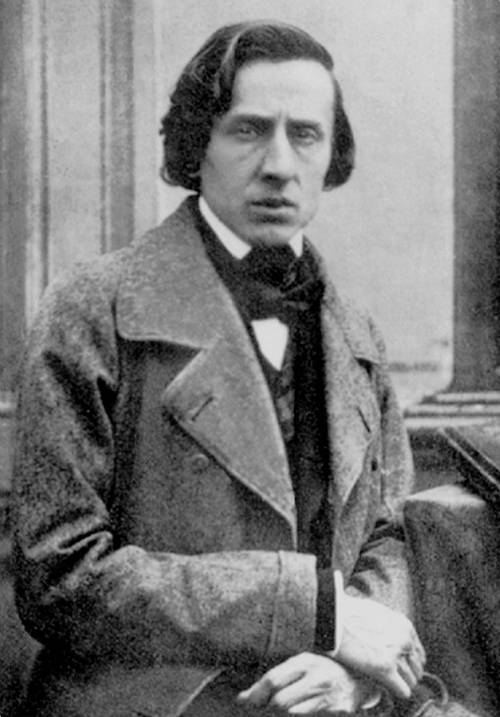
FAQ About Frédéric Chopin

Who was Frédéric Chopin?
Frédéric Chopin was a Polish composer and virtuoso pianist of the Romantic era. He is best known for his solo piano works and influential style, which combined a lyrical and poetic sensibility with technical brilliance. Born in 1810, Chopin spent much of his career in France and became a leading figure in 19th-century music.

What are Frédéric Chopin's most famous compositions?
Some of Frédéric Chopin's most famous compositions include his "Nocturnes," "Études," "Preludes," "Ballades," and "Polonaises." His compositions like "Nocturne in E-flat major, Op. 9, No. 2," "Étude Op. 10, No. 3 (Tristesse)," and "Ballade No. 1 in G minor, Op. 23" are particularly celebrated for their beauty and technical complexity.

How did Chopin influence piano music?
Chopin revolutionized piano music by developing a distinct style that emphasized expressive depth and technical innovation. He introduced new textures and sonorities, explored harmonic and rhythmic experimentation, and expanded the expressive capacity of the piano. His works influenced subsequent composers and remain a cornerstone of piano repertoire.

Where was Frédéric Chopin born?
Frédéric Chopin was born on March 1, 1810, in Żelazowa Wola, a village in Poland that was part of the Duchy of Warsaw at the time. Today, Żelazowa Wola is a place of pilgrimage for music lovers and a museum dedicated to Chopin's life and works.

Did Chopin write any symphonies or operas?
No, Frédéric Chopin did not compose any symphonies or operas. His entire output was focused on the piano, including solo piano works and some pieces for piano and orchestra. Chopin's works are renowned for their emotional depth and intricacy, emphasizing the poetry of the instrument.

What is the significance of Chopin's "Nocturnes" in classical music?
Chopin's "Nocturnes" are significant for their pioneering role in developing the nocturne as a musical form. They showcase his ability to convey deep emotions and create lyrical, expressive piano music that was both innovative and influential. The "Nocturnes" are beloved for their beauty, emotional range, and technical challenges.

Was Chopin involved in any political movements?
While Frédéric Chopin was not directly involved in political movements, his Polish heritage and sentiments subtly influenced his music. During Poland's periods of political turmoil and struggle for independence, his compositions, especially his "Polonaises," became symbols of national pride and resistance.

How was Chopin's music received during his lifetime?
During his lifetime, Frédéric Chopin was highly regarded as a composer and performer, particularly in Paris, where he spent much of his career. His performances were well received by the elite and musical connoisseurs, although his delicate style did not always appeal to mass audiences. His compositions were praised for their artistry and emotional depth.

What challenges did Chopin face in his personal life?
Frédéric Chopin faced numerous challenges in his personal life, including poor health, financial instability, and a tumultuous relationship with the writer George Sand. He struggled with tuberculosis, which greatly affected his health and ultimately led to his early death at the age of 39 in 1849.

Who were Frédéric Chopin's major influences?
Chopin was influenced by composers such as Johann Sebastian Bach, Wolfgang Amadeus Mozart, and Ludwig van Beethoven. He also drew inspiration from Polish folk music, which is evident in his polonaises, mazurkas, and other works, blending traditional Polish elements with classical forms.

Why is Chopin often associated with the Romantic era?
Chopin is associated with the Romantic era due to his innovative and expressive compositions, which embodied the Romantic ideals of individuality, emotional depth, and artistic freedom. His use of lyrical melodies, rich harmonies, and evocative expression were hallmarks of Romantic music.

What is the relationship between Chopin and the writer George Sand?
Frédéric Chopin and George Sand, a renowned French novelist, had a notable romantic relationship that lasted from 1838 until 1847. The relationship was marked by intellectual companionship and mutual artistic influence, although it eventually ended due to personal differences and disagreements.

What makes Chopin's "Études" unique?
Chopin's "Études" are unique for their combination of technical brilliance and expressive depth. Unlike many études composed primarily for practice, Chopin's studies are artistic masterpieces that blend technical challenges with musical expression, these pieces are often performed in concert settings for their virtuosic and emotive qualities.

Did Chopin ever teach piano?
Yes, Chopin was a sought-after piano teacher in Paris, where he taught many students, mostly from the aristocracy. While he taught primarily to support himself financially, he was known for his thoughtful and individual approach to instruction, focusing on technique and musicality.

What is a Polonaise, and how did Chopin contribute to this form?
A Polonaise is a traditional Polish dance in triple meter, characterized by its rhythm and stately tempo. Chopin elevated the polonaise to a high art form, composing several that blended the traditional dance style with complex musical structures, nationalism, and expressive content. His polonaises are celebrated for their grand and heroic qualities.

How did Chopin's compositions reflect his Polish identity?
Chopin's compositions often reflected his Polish identity, particularly through forms like the mazurka and polonaise, which incorporated elements of Polish folk music. His music is infused with a nationalistic spirit, capturing the essence of Polish culture and resonating with themes of nostalgia and heroism.

What was Chopin's relationship with Franz Liszt?
Chopin and Franz Liszt were contemporaries and had a complex relationship marked by mutual admiration and rivalry. Liszt, a highly acclaimed pianist and composer, praised Chopin's unique style and occasionally performed his works. Their friendship experienced ups and downs due to differing personalities and careers.

Why is Chopin's "Funeral March" well-known?
Chopin's "Funeral March" is well-known for its somber and evocative character, part of his "Piano Sonata No. 2 in B-flat minor, Op. 35." The march has become emblematic of mourning and is frequently played at funerals and memorials, including Chopin's own funeral in 1849.

What impact did Chopin's health have on his music?
Chopin's fragile health, which included chronic respiratory and other ailments, influenced his music both directly and indirectly. His health issues often limited his public performances, focusing his creative energy on composing. The emotional depth and introspective quality of his music are sometimes attributed to his health struggles.

How has Chopin's legacy continued in modern classical music?
Chopin's legacy endures in modern classical music through his influence on composers, pianists, and educators. His works are a staple of the piano repertoire, studied and performed by pianists worldwide. The innovative techniques and emotive expression continue to inspire and shape interpretations and compositions today.
